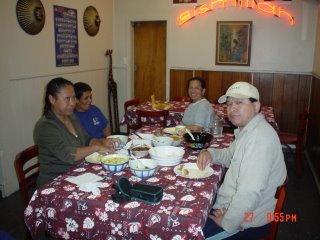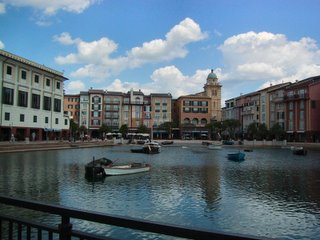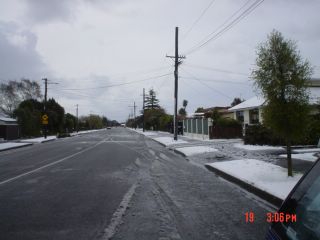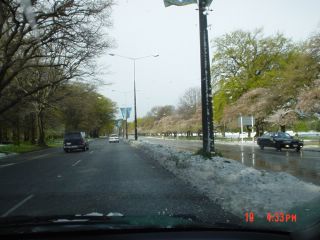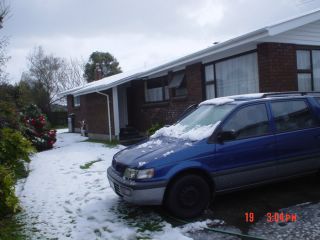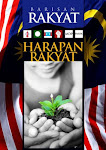Title: The Girl from the Coast
Sorry Bapak Pramoedya Anantha Toer, this is just the title, as you wrote about your grandmother. I also want to write stories told by my late maternal grandmother Mariam, and yes I don’t even remember my great grandfather’s name.
She didn’t know how old she was, maybe about 6 year old, maybe older. She couldn’t tell me much about her family, only that she and my paternal grandmother, Rosni binti Mustapha are cousins. She told me that she came from town called Kalengan, by the coast of Jawa Tengah. (Later talking to Indonesian friends, they said its Pekalongan, a town on the northern coast of Jawa Tengah, I cross checked with her Ponorogo dialect, spoken by people in the vicinity).
Her village was about 7 miles from town, in her own words, “from here (Batu 7) to Parit Tiga (Batu 12)”. In those days, probably circa 1925, there was weekly market in town, so her parents used to bring village produce to town. She used to tag along her parents on foot to town, starting at 1am; her parents sold village produce like tapioca etc. to buy rice and other stuff. Poverty was rife in those times, parents married off their young daughters, simply because they couldn’t afford to feed them.
That year my paternal grandmother was about 16, she was married off to my paternal grandfather Kusni. (I do not know my great grandfather’s name). Another one of her cousins, Suci was married off as well. Mariam was given off to her cousin Rosni, to be taken care off by her two cousins who just got married. The bridegrooms and their young brides sailed to Port Klang on a kapal layar, sailing ship maybe about 20metres. During the voyage the two cousins, my grandmothers resign to the fact that they were leaving their homeland for good. Suci cried day and night, ruing the fact that she will never see her parents, family or her homeland ever again.
It took about a week to arrive in Singapore, where they stopped for a day or so for provisions before continuing to Port Klang. From Port Klang to Tanjong Karang might have taken 2 days on kereta lembu.
In those times, the government opened tracts of land in Tanjong Karang for padi and coconut.
When Mariam was old enough, about 13, she was married off to my maternal grandfather, Daud bin Marhakim.
Life couldn’t be better in Selangor, padi land to grow rice and coconut land for cash crop of coconut and bananas. The river also teemed with freshwater fish like sepat, keli, puyu, haruan and udang galah in those days, replenished with annual monsoon floods. According to Auntie Mariah, my grandfather used to grow tapioca and keladi on road reserve land near their house. There were a few fruit trees around their house, jambu, breadfruit and ciku among them, some of them survived until my childhood in the seventies.
My paternal grandfather Kusni died when my father was 2 years old, leaving grandmother Rosni with two young children to feed, my father and Auntie Mariah, relying on the goodwill of her fellow immigrant neighbours. Presumably they were just 5 years in Selangor back then.
If I could turn back time, I could have taken my grand mother Mariam on a tour back to her homeland.
Kholid says:
Satu masa dahulu embah pernah cerita padaku, kampungnya di tepi pantai. Ramai orang menyindai kain batik yang siap dicelup warna. kain-kain panjang tidak dipotong lagi dengan warna sumba...
Hj Basiron says:
i,m sorry. i don't know much. sure it is a great project. it seem you have more info then me.kholid kata ayah kusni bernama man musa.it was one day masa dulu dulu, kholid nak cari nama syarikat keluarga. so timbul nama tu.our mistake we don't get closer to our grand parent when they are alive.one thing came across to me one day. if we get gleanology soft ware will be usefull. we can trace back our close relative.there are so many second cousin of us around but unfortunately we do not know.
Hj. Basiron says:
i balik kg semalam kerana nak bagi duit kat orang tua dan kerana pakmin mantu anak nombor dua last. nombor sembilan.u tau ke sanak saudara kita yang ni semunya anak ramai. anak kesembilan namanya ariyani dan kahwin dengn orang johor. tktau sebelah mana.dia sebaya dengan fauziah.
maka dapat le i jumpa pak gendu.u tau nama sebenar pakgendu? i bet u taktau.
sambil tu i bawa satu buku besar konon nak tulis nama salsilah.keluarga. pak gendu yang bagi sikit sebanyak dan juga kakak dan mak /bapak.
kata mak, embah mariem di ambil adik angkat olih tiga beradik embah esti. embah suchi dan embah rosni. dia kecik lagi, telah ditinggal mati olih ibunya. bapaknya kawin lain. sebab itu dia merantau ikut embah esti tiga beradik. kata pakgendu bapaknya bernama joyowarso.
emak kata, embah mariem tak tau nama bapaknya sendiri sebab tu masa nak buat kad pengenalan di ambil nama mustafa sebagai nama bapanya.
kata pakmin embah daud bapanya matkarmin , ibunya taktau sebab neneknya mati dia masih kecil.
embah daud ada empat beradik. abangnya bernama samsi. duduk di batu 9. kahwin dengan mbah esti. embah mariem tolong jaga anak embah esti. lepas tu dijodohkan dengan embah daud.lepas tu emak dan bapak dijodohkan sebab embah rosni tu adik embah esti. embah daud adik embah samsi.
adik embah daud namanya embah sarmi. dulu duduk dekat rumah arbangi/ sidek/rahman.
sekarang baru jelas mengapa masa kecik kecik dulu pada hari raya mesti pergi rumah rumah tersebut. baru nampak kepentingan nya.tapi bila perasan dah dua tiga pupu ni dah renggang le. tak penting lagi.
lupa pula mana datang nama man musa. rasanga kholid yang dapat.bapak taktau mana datang nama tu. embah kusni yang dia tau dua beradik aja. nama nya misran. dia taktau bin nya.mungkin kena tanya wak mariah.
kakak ada bagi tahu kang jalal sebelah rumah tu bapa nya bernama juid. ada kaitan tapi taktau bagaimana. sebab tu wak supinah arwah dulu taksuka betul dengan kita.makan buah jambu dia pun dia maki hamun.tapi kita curi juga.
i rasa kita kena interview wak mariah sebab dia lebih tua dan tau lebih banyak salsilah bapak.tapi i taktau dia duduk kat mana. pucung. alamat takde.
Kholid says:
Nama betul Pak Gendu - Sukardi
Hj. Basiron says:
just two days, i aready forgot what are mbah daud's siblings name. tak tenguk buku masa sebelum kemari. daud bin matkarmin . emak di bela sementara olih mak saudaranya. kakak mbah daud pasal dia kembar. duduk dengan adik beradik mbok sirop.kata nya dulu dia selalu kena dera.olih adik beradik tu. yang paling anti usup ketuk yang duduk sebelah rumah embah. suka bela burung merbuk. empat beradik tu datang dari jawa.
bolih jadi kalau di korek siapa joyowarso tu bolih dapat info dari sana. juga matkarmin, mustafa . bolih jadi kampung dia orang berdekatan di pekalongan. kalau ada tugu kerana ternama di pekalongan , maka bolih di selidik. tapi kalau cuma rakyat biasa . susah le. dulu pernah terdengar cerita, embah daud yang pengkor kena gigit ular tu , dan abangnya, katanya lari ke tanah melayu setelah membunuh penyamun yangmenceroboh rumah mereka. penyamun tu cuba naik ikut lubang di lantai yang bila terjongol saja kepala , arwah embah tu cekik dengan menolak tampah pada batang leher penyamun tu. sampai mati. lepas tu dia orang takut ada orang balas dendam , dia orang cabut lari.
Hj Basiron says:
memang pun duk dengan kak patimah. patimah bt dolah kot.atau pun abdullah. sama dengan kak markonah.imam sukani bin nya redhuan. dengan suami pertama , amat, takde anak.dengan moktar pun takde anak. last pak zainudin yunan. baru ingat, kata mak isteri mat karmin bernama sarminah. kira ok le tu. banyak juga dapat.i ingat, semua orang tu tinggal di jawa. pekalongan agaknya. kemudian tadi terjumpa kain sarung made in pekalongan. kebetulan.
dgn gleanology page dia besar sikit. manakala yang satu lagi tu kecil. so i padam je.
Hj Basiron says:
anak embah daud. rukiah.rukimin. rukinem. kamsaton.kembarnya. lupa tanya.rukinah. saringah. supingat. abd razak. misilah.
pak sarbini kawin dengan rukiah dan rukinah . yang pertama dpt kasbiran dan asmuni. yg kedua dpt asraf dan rahimah. one day i nak cari kang kasbiran. duk kg pandan.. taktau alamat.i pun tak dapat imagine rupa dia.
kalau tak salah dgn genbox bolih extract dari computer jauh ye. i tak paham.
baru ni i terjumpa satu kedai bolih modify gambar . jadi super impose baru dengan lama. lepas tu i tersenyum sorang sambil jalan sampai kena tegur orng kat taman tun ni. awak sakit ke? . adalah yang saya fikirkan tu. nah . agaknya kalau dapat kita cari gambar gambar lama bolih jadi bahan buku. malangnya i tak de gambar simpanan. tah mana pergi.
lupa list anak mbah daud is like this. rukiah. rukimin. rukinem.kamsaton. kembar.rukinah. sukardi.saringah.supingat. abdul razak. misilah ok ye.
hj Basiron says:
wak nik tu rukinem le. i pun baru tau, takpernah tanya dia nama sebenar. masa kat rumah wak rukimin muka wak nik dekat sama dengan mbah yem. begitu juga rupa rahimah. gemuk sikit. dulu lain.
rukinah adalah adik mak. kembar mak taktau nama. kalau taksilap dia mati kena timpa buah kelapa masa umurnya 12 tahun . atau sembilan tahun. itu pun i tak tanya dengan wak min, lupa.rukinah mati kena langgar lori masa ambil jemuran pandan kat tepi jalan besar. i ingat lupa, dulu dulu i manja dengan lek nah sebab dia suka layan i. masa kecik le.
bab gambar, scanner ni lina pandai kut. tapi lina sebuk dengan bisness dia mana ada masa. i tak jumpa satu bijio album pun kat rumah. mana semua nya pergi , i pun tak tau. mungkin kak sal ada simpan. tapi macam gambar ramai nenek rosni dulu tu , macam pernah nampak. tapi entahle.
i tak sure pasal kang jalal. kata kakak sal, bapak kang jalal nama dia juid. emak dia supinah. adik dia bin lain. yang berkait mungkin pak juid. masaalah nya bapak denied pak jalal ada kaitan . imam damanhuri ikut tu juga. entahlah. dia kata pak kusni adik beradik dua orang saja. misran. kholid jumpa surat kerakyatan kusni bin mat musa.
even antara mbah esti dan mbah samsi ada kecelaruan . i ingat esti, suchi, rosni bukan nya samsi suchi rosni. kakak yg lupa kut. tapi kalau anak bungsu embah esti kawin dgn anak pak ghapur, tua le dia tak? i pun tak faham. masa i pergi rumah dia dulu kecik kecik macam dah tua. takkan anak dia baya kita. kawin dgn orng muda dari kita.
dulu pernah dengar mak mengata, suami wak supinah jualkan tanah bapak. masa dia kecik dulu. tapi macam namanya ibrahim. ke i yang nyanyuk. tak tau yang mana satu.
nooryahaya says:
tak tahu aku pulak pasal kembar emak mati kena timpa kelapa.
kalau emak kata macam tu, tanah bapak dijualkan oleh suami mbok supinah, memang ada possibility, emak pernah citer, masa mbah rosni baru janda kematian suami, tinggal anak kecik dua, sedara mara arwah mbah kusni semua minta tanah harta peninggalan dan dijualkan sebahagiannya. mak kata kesian mbah rosni, janda tak ada nak bagi makan anak2, jadi terpaksa jual tanah etc. salah satu tanah yg emak pernah tunjukkan pernah di punyai mbah kusni dekat rumah anip/hanif tu. sempadan belah barat rumah anip tu lah.
aku tak pelik bapak tak mengaku ada kaitan.. memang bapak anti dgn mbok supinah.dan suami mbok supinah. tapi dia ok pulak dgn imam damanhuri.
masa arwah mbah daud meniggal dulu dia pegi rumah kang jalal dan kak (sapa ke nama elor le kang jalal seberang jalan) pukul 3 pagi bagi tahu. sebab sedara.
nama ibrahim memang macam pernah dengar. tak tahu lah kalau satu hari kita jumpa kang jalal cuba tanya dia, mana tahu dia nak cakap.
maslina says:
gambar rasanya emak dah buang....tak dapat nak kutip le....kena makan dek anai-anai....
scanner ada ni.....boleh scan masuk...gambar tak de macamana nak cari?
Eh... setau i kembar emak yang ninggal accident tu....emak cite macam tu...
entahlah...





